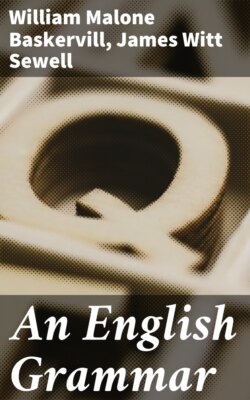Читать книгу An English Grammar - James Witt Sewell - Страница 30
На сайте Литреса книга снята с продажи.
Special Remarks on the Possessive Case.
ОглавлениеTable of Contents
Origin of the possessive with its apostrophe.
64. In Old English a large number of words had in the genitive case singular the ending -es; in Middle English still more words took this ending: for example, in Chaucer, "From every schires ende," "Full worthi was he in his lordes werre [war]," "at his beddes syde," "mannes herte [heart]," etc.
A false theory.
By the end of the seventeenth century the present way of indicating the possessive had become general. The use of the apostrophe, however, was not then regarded as standing for the omitted vowel of the genitive (as lord's for lordes): by a false theory the ending was thought to be a contraction of his, as schoolboys sometimes write, "George Jones his book."
Use of the apostrophe.
Though this opinion was untrue, the apostrophe has proved a great convenience, since otherwise words with a plural in -s would have three forms alike. To the eye all the forms are now distinct, but to the ear all may be alike, and the connection must tell us what form is intended.
The use of the apostrophe in the plural also began in the seventeenth century, from thinking that s was not a possessive sign, and from a desire to have distinct forms.
Sometimes s is left out in the possessive singular.
65. Occasionally the s is dropped in the possessive singular if the word ends in a hissing sound and another hissing sound follows, but the apostrophe remains to mark the possessive; as, for goodness' sake, Cervantes' satirical work.
In other cases the s is seldom omitted. Notice these three examples from Thackeray's writings: "Harry ran upstairs to his mistress's apartment;" "A postscript is added, as by the countess's command;" "I saw what the governess's views were of the matter."
Possessive with compound expressions.
66. In compound expressions, containing words in apposition, a word with a phrase, etc., the possessive sign is usually last, though instances are found with both appositional words marked.
Compare the following examples of literary usage:—
Do not the Miss Prys, my neighbors, know the amount of my income, the items of my son's, Captain Scrapegrace's, tailor's bill—Thackeray.
The world's pomp and power sits there on this hand: on that, stands up for God's truth one man, the poor miner Hans Luther's son.—Carlyle.
They invited me in the emperor their master's name.—Swift.
I had naturally possessed myself of Richardson the painter's thick octavo volumes of notes on the "Paradise Lost."—DE QUINCEY.
They will go to Sunday schools to teach classes of little children the age of Methuselah or the dimensions of Og the king of Bashan's bedstead.—Holmes.
More common still is the practice of turning the possessive into an equivalent phrase; as, in the name of the emperor their master, instead of the emperor their master's name.
Possessive and no noun limited.
67. The possessive is sometimes used without belonging to any noun in the sentence; some such word as house, store, church, dwelling, etc., being understood with it: for example—
Here at the fruiterer's the Madonna has a tabernacle of fresh laurel leaves.—Ruskin.
It is very common for people to say that they are disappointed in the first sight of St. Peter's.—Lowell.
I remember him in his cradle at St. James's.—Thackeray.
Kate saw that; and she walked off from the don's.—De Quincey.
The double possessive.
68. A peculiar form, a double possessive, has grown up and become a fixed idiom in modern English.
In most cases, a possessive relation was expressed in Old English by the inflection -es, corresponding to 's. The same relation was expressed in French by a phrase corresponding to of and its object. Both of these are now used side by side; sometimes they are used together, as one modifier, making a double possessive. For this there are several reasons:—
Its advantages: Euphony.
(1) When a word is modified by a, the, this, that, every, no, any, each, etc., and at the same time by a possessive noun, it is distasteful to place the possessive before the modified noun, and it would also alter the meaning: we place it after the modified noun with of.
Emphasis.
(2) It is more emphatic than the simple possessive, especially when used with this or that, for it brings out the modified word in strong relief.
Clearness.
(3) It prevents ambiguity. For example, in such a sentence as, "This introduction of Atterbury's has all these advantages" (Dr. Blair), the statement clearly means only one thing—the introduction which Atterbury made. If, however, we use the phrase of Atterbury, the sentence might be understood as just explained, or it might mean this act of introducing Atterbury. (See also Sec. 87.)
The following are some instances of double possessives:—
This Hall of Tinville's is dark, ill-lighted except where she stands.—Carlyle.
Those lectures of Lowell's had a great influence with me, and I used to like whatever they bade me like.—Howells
Niebuhr remarks that no pointed sentences of Cæsar's can have come down to us.—Froude.
Besides these famous books of Scott's and Johnson's, there is a copious "Life" by Thomas Sheridan.—Thackeray
Always afterwards on occasions of ceremony, he wore that quaint old French sword of the Commodore's.—E. E. Hale.
